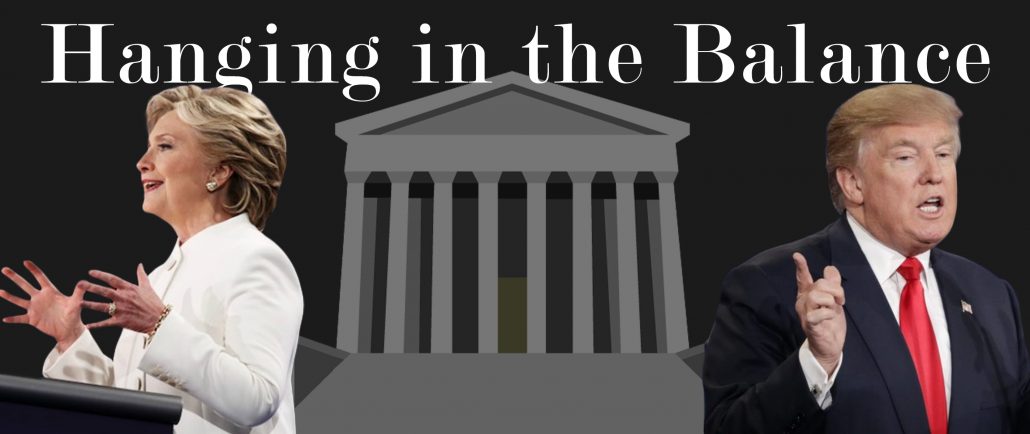Third debate was fierce, but covered little ground
Presidential politics have gotten especially heated this time around. Accusations and insults are in no short supply as the presidential race reaches its climax, and meaningful discussion about policy is still lacking. The closest that we got to seeing civil discourse between the presidential nominees was in a series of presidential debates hosted by a trio of American universities. Last week’s presidential debate at the University of Nevada, Las Vegas focused for the most part on substantive issues — like the composition of the Supreme Court and the economy — that will undoubtedly affect the lives of millennials for several years to come. Unfortunately for voters, the discourse in this third debate was still largely limited in scope — before the debate devolved into a dynamic display of ad-hominem attacks and nonsensical claims.
Actually, using the term “civil discourse” to describe the presidential debates during this election might be wholly inaccurate. From deliberately speaking over debate moderators to interrupting the opposition with exclamations of “my turn” and several near-baseless accusations, it was clear to anybody watching the debates that this electoral season has more in common with stereotypical high school politics than a competition for the highest office in the United States. This is concerning for the future of professionalism in politics, but the lack of substance in the candidates’ arguments is even more worrying for the future that millennials will inherit.
From the very start of the debate about the Supreme Court, definition and clarity were difficult to uncover. Democratic nominee Hillary Clinton has not named any judges she would appoint to the Supreme Court. She did express her hope that President Obama’s nominee, Merrick Garland, would be confirmed by the Senate, but offered little more than that. With the sole exception of the Citizens United case, Clinton has also not outlined specific judicial obstacles that must be overcome by the Supreme Court. She explained in vague terms that her Supreme Court nominees would “stand up” for women’s rights, the LGBT community and against unregulated campaign finance — that they would, in her words, “represent all of us.” Clinton also stated that she “support[ed] the Second Amendment,” but suggested that there is a “balance” between the respecting gun ownership and protecting life. Her failure to clarify the precise description of this balance has resulted in zealous gun owners growing increasingly concerned, but at first glance her statements also seemed to roll back her strongly worded comments about gun manufacturer liability for mass shootings dating back to the Democratic primary race.
Republican nominee Donald Trump came out in favor of justices that “will interpret the Constitution the way the founders wanted it interpreted.” Trump also expressed his opposition to the federal right to an abortion established by the Roe v. Wade decision. Given the composition of Trump’s list of judges, this was wholly unsurprising. Trump fumbled, however, when it came to in-depth discussion of controversial cases. Instead of explaining his legal reasoning, he pointed to how “extremely angry” Hillary Clinton was about the result of a particular case that defended gun rights, D.C. v. Heller.
The debate did not create a detailed discussion of judicial ethics or philosophy, as one might hope or expect. The most that the audience could reasonably hope to understand about the future composition of the Supreme Court was what they probably knew already: that there is a choice between a traditionally conservative court and an actively liberal one. Nothing new was revealed.
The candidates’ plans for improving the American economy were similarly vague and unsatisfying. The effects of market stagnation and instability in the immediate future will be felt most strongly not by those who are older and have secure jobs, but by the millions of millennials will enter the workforce in each upcoming year. The Social Security trust fund is expected to be unable to pay for all benefits by the 2030s, and Medicare is expected to suffer the same fate if the status quo is maintained. The only ways that these benefits can be secured for when millennials eventually retire is if revenue is raised, expenditures are slashed, or both.
However, neither candidate expressed their willingness to take that action. When asked about the problems with entitlement spending, Trump blamed the Affordable Care Act for those maladies. He then reemphasized that he would be cutting taxes, creating “tremendous jobs” and explained that his plan’s (unrealistically) projected 4 to 6 percent annual growth in the size of the American economy would take care of these issues by itself. Clinton’s plan, for her part, did not inspire confidence, either.
All in all, it appears as if American voters could learn very little of substance from these debates. Liberals will likely continue to find comfort in Clinton’s commitment to underprivileged minorities and experience, whereas conservatives will probably continue to reluctantly support Trump despite his flaws and cavalier antics. Undecided voters, on the other hand, are likely still as confused about who to vote for as they were a month ago. Undecided millennials in particular should make their choice wisely — our futures are on the line.

